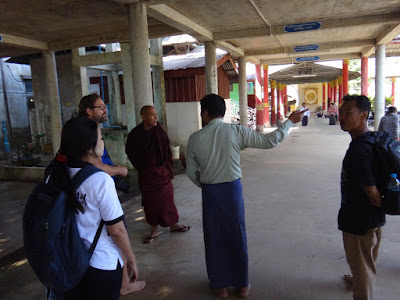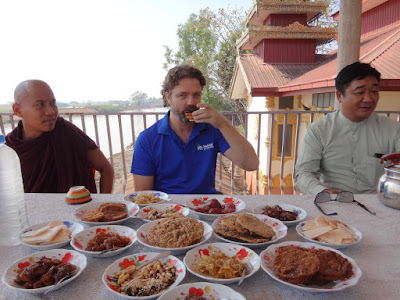4. Myanmar Bago community project visit
The final day of the working week in Myanmar involved a very
early start out of Yangon to visit a HFH Myanmar
project in Bago, the fourth largest city of Myanmar. It was an opportunity to move out of the
capital and see some rural parts of the country, where approximately 70% of
Myanmar’s population still live. HFH
Myanmar has been working for the past 2 or 3 years with corporate partner
Nissan, who have been responsible for the delivery of water, sanitation and housing interventions in 18 villages on the periphery of Bago, a highly rural area with
ricefields and other agriculture all around.
Each village has its own buddhist pagoda, a place of worship
with very beautiful and ornate architecture with the highest golden temple
rooves dotted across the flat landscape.
In the pagoda that we visited, a new water treatment system had been
built to purify water that was already being pumped significant distances from
fresher water areas, but had not been suitable for drinking. Nissan’s corporate
social responsibility program funded the project, working through World Concern
for the water/sanitation component of the program, resulting in vast quantities
of drinking quality water that serve the entire village and beyond with excess
water being shared with neighbouring villages also from time to time. The Nissan project also included a
significant housing construction component which HFH Myanmar delivered, with
around 100 rebuilt bamboo housing in one of the 18 villages.
During the visit, we had the extraordinary honour of being invited into the pagoda by the head monk who set up a banquet of sorts with
tea and snacks, where we were able to speak with the water/sanitation community
committee which had driven the project locally and which will continue to
maintain the physical interventions. What a privilege to be welcomed into the
beautiful surrounds of the pagoda, with such a serene setting, both visually and
audibly, the bird songs being the primary source of sounds around where we
sat together. We also were encouraged to
drink glasses of water that the new treatment
We also visited the village where around 80 homes have been
rebuilt through the Nissan project and through the HFH Global Village volunteer program,
which involves teams of volunteers coming at different times from different
countries to fundraise and help build the houses alongside the families. The
community committee responsible for transparency and fairness in selecting beneficiary families and
looking after communal matters were waiting to meet us.
While HFH
Australia has not yet to my knowledge sent any Global Village teams from Australia to help build
the houses, I represented HFH generally and was moved by the joy expressed by
the community, after a brief meeting and sharing of experiences, racing to show
me their improved houses, involving:
-
increased house floor space
-
division of spaces within the house itself to
increase privacy for parents and children
-
higher floors from the ground to reduce the risk
of flooding during the rainy season and to provide cool spaces below the house
to hang hammocks
-
improved out-house toilets with sewage
collection tanks
-
rainwater collection tanks
-
improved bamboo materials less prone to
degeneration through action of mites
-
additional housing extensions being built by the
family themselves following HFH Myanmar’s intervention to continually improve
the living conditions of the families
-
construction skills and income gained by
numerous members of the community during the house-building process itself.
The beneficiary families expressed how they are now able to
concentrate on the important matters of education and income generation now
that they can count on the quality of their homes to keep them cool/warm,
healthy and safe. They also expressed
how much they miss the Habitat volunteers that had come to build housing but
built unforgettable relationships with the people in the community.
The HFH Myanmar team based in Bago are doing extraordinary work with the community and volunteers from all around the world.
The HFH Myanmar team based in Bago are doing extraordinary work with the community and volunteers from all around the world.


















Comments
Post a Comment